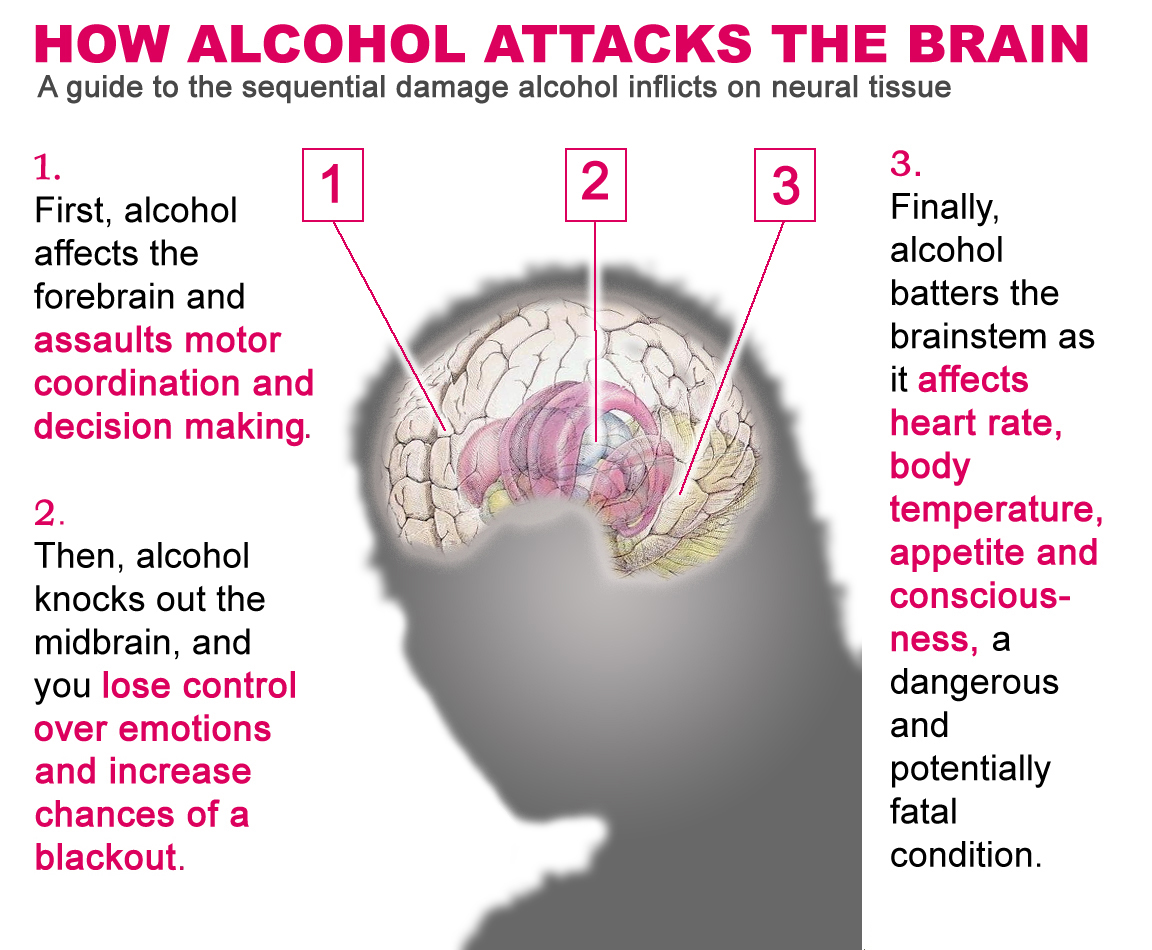
As anyone who has ever had an alcoholic drink will know, alcohol can make you more chatty, more confident, and less coherent.Alcohol has a particularly toxic effect on the liver and brain, as well as on the heart, stomach and pancreas. When you drink a harmful level of alcohol, there is a danger of it damaging your whole body.How alcohol affects your brain. This is partly down to neurotransmitters, which are chemicals that help to transmit signals from one nerve (or neuron) in. Alcohol is a depressant, which means it can disrupt that balance, affecting our thoughts, feelings and actions and sometimes our long-term mental health. The brain relies on a delicate balance of chemicals and processes.
In severe cases, this can result in a coma.Drinking a lot in a short period of time also affects your memory. This is due to alcohol affecting your brain chemicals. The more you drink, the more these are affected. For a more comprehensive understanding, you can also visit our interactive illustration The Effects of Alcohol on the Body for more information on the short-term and long-term effects of alcohol.How does alcohol affect the brain? Short-term impactWhen you drink, your brain activity and energy levels lower, slowing down your speech, thoughts and movement.


Long-term impactWhen someone’s drinking is long-term and heavy, this can result in chronic alcohol gastritis. This in turn can result in stomach pain, nausea, bloating and vomiting. The impact of alcohol on the stomach Short-term impactWhen you drink, your stomach produces more acid than usual, which inflame and damage the stomach lining.
Long-term impactHeavy chronic drinking can leave a person more at risk of developing conditions such as pneumonia, respiratory syncytial virus (RSV) infections and acute respiratory distress syndrome (ARDS). How does alcohol affect the lungs? Short-term impactWhen you drink alcohol and its vapour enters your airway, this can inflame the nasal passages and sinuses, stopping them from being able to fight off infection effectively.Also, as alcohol weakens the gag reflux, this can lead to people breathing in foreign objects, increasing the risk of choking and infection. Long-term impactThe rise in blood pressure and cholesterol levels caused by regular heavy drinking can increase the risk of chronic kidney disease. As this urine is more concentrated, it can irritate and inflame the lining of the bladder, resulting in urinary tract infections. This happens as alcohol overwhelms the kidneys with waste products, stopping them from functioning effectively.This can then cause the bladder to fill up with more fluid.
Alcohol and its impact on reproduction Short-term impactStudies suggest that the more alcohol someone consumes, the more their fertility is likely to be affected. This can damage organs throughout the body, particularly the liver and the brain. Long-term impactIn the long-term, heavy drinking can damage the small intestine and cause bacteria and toxins to enter the bloodstream. It interferes with the body's absorption of water and speeds up digestion through the large intestine.
Drinking can also lead to dehydrated, dry skin, as alcohol is a diuretic. How alcohol affects the skin Short-term impactAlcohol consumption can cause facial flushing, as blood vessels dilate and blood flow increases. Long-term impactSomeone who is a chronic heavy drinker is more at risk of developing periodontal diseases due to their alcohol consumption, along with potential nutritional deficiencies and poor immunity. The acidity of certain alcoholic drinks can also lead to tooth decay and oral cavities. How does alcohol affect the mouth? Short-term impactAs alcohol reduces saliva production, this can increase the risk of oral cavities, gum irritation and gum disease, as saliva helps to protect the mouth from bacteria and plaque. Long-term impactHeavy and long-term alcohol consumption can affect people by causing menstrual and reproductive disorders.It can interfere with menstrual cycles, ovulation and fertility.It can also cause impotence and infertility by reducing the production of testosterone and testicle shrinkage.The impact of alcohol on bones Long-term impactWhen someone drinks heavily over a sustained time period, it can impact their bone quality and leave them at risk of osteoporosis.Not only a risk for older adults, it can also impact teenagers and younger adults, as their body is building stores of calcium for long-term bone health.
If you would like to find out more about how we can support you, please visit our dedicated addiction treatment page.You can also get in contact with our team using the details below for more information on the treatment that we can provide to you. Support and treatment for problem drinkingHere at Priory Group, we are able to support people who are struggling with their alcohol consumption.Our rehabilitation facilities , outpatient and day care services have helped many people to get started on their road to recovery. It can also lead to psoriasis, as well as seborrheic and nummular dermatitis.


 0 kommentar(er)
0 kommentar(er)
